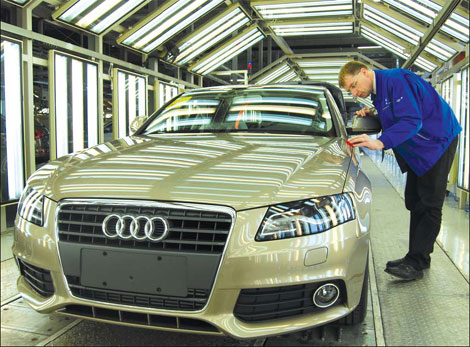Cars
German in the house
Updated: 2011-04-22 14:53
By Lu Chang (China Daily European Weekly)
Auto veteran falls in love with northeast city at 1st visit
When German auto veteran Kueck Herbert first came to Changchun 11 years ago, he never expected to stay for good.
|
Kueck Herbert has lived in Changchun for 11 years and describes the city as vibrant, clean and dynamic. Lu Chang / China Daily |
"Although people now are talking about Changchun a lot more often in Germany because of its auto industry, before I came here, I knew nothing about it," says the 48-year-old Herbert, who lives in the capital of northeastern Jilin province with his Chinese wife and 3-year-old daughter.
Herbert moved to Changchun principally because of his work commitments. After working for a decade in the headquarters of German auto giant Volkswagen (VW) in Wolfsburg, he was sent to the Chinese industrial city that was set to become a global auto-manufacturing center.
In FAW-VW, a joint venture between First Automobile Works and VW, Herbert worked as a production manager. He vividly remembers those days in the workshops with Chinese colleagues.
"Unlike these days, the FAW was only a small factory when I first arrived, making 350 cars a day," he says, adding that Chinese workers are very devoted to their jobs and can work seven days a week if needed.
He feels a strong connection to the city where he met his wife, Li Yan, a former TV host in the Changchun television station.
Li's smile and charm was an instant hit with Herbert. It was primarily the "oriental mystique" about Li that attracted him, Herbert says - a mystery that still endures.
Li is what gives him a good life at home and eases the challenges of living long term in a foreign country.
"We got married in Germany two years after we met in 2004," he says. "I can't speak Chinese and she can't speak English or German, but language has never been our barrier. We can always find a way to communicate. I think that's the chemistry we have."
After 11 years living in Changchun, Herbert describes it as "vibrant, clean and dynamic" and "a place where one can easily become stuck in".
He enjoys working with his colleges every day and loves the warm-hearted dongbeiren (people of Northeast China).
"Changchun is a good place to begin in China," Herbert says.
"Few people speak English here, compared to places like Beijing and Shanghai, so it makes learning the language a necessity. Plus the people whom I work with are great!
"My Chinese co-workers can strike a good balance between work and personal life," he says. "We always go to dinner together after work so for me it's more a community than a workplace.
"German people are tougher and like doing things alone."
In 2007, Herbert returned to Wolfsburg with his wife for a work assignment. It was then that he realized his affection for Changchun had grown.
"There's something about German cities - they never change. Even though I left for 10 years, everything remains the same," he says. "But for Changchun, every time I come back even after a year, it will have a new face."
Changchun, a second-tier Chinese city, has developed rapidly in recent years. FAW-VW produces 2 million cars each year and plans to increase its production capacity to 3 million cars in the coming years, to satisfy the growing purchasing power of Chinese consumers.
"China's speed hit me like a sack of bricks," Herbert says. "More people than I have ever seen in one place swarm the plazas. Buildings reached high into the sky. Modern shopping centers, retail outfits, iMax cinemas and what might be a more technological and professional culture is emerging as well."
Changchun is also an exciting place to live from a work perspective, especially in the auto industry, he says.
The city seems to be coming into its own as an economic powerhouse, with a GDP that has outpaced the national average year-on-year, with sectors like logistics, high-tech and finance helping to drive the local economy.
Herbert says that to succeed here, expatriates need to realize that Chinese people have "just as many preconceived notions about us as we do of them. Knowing and understanding how they think and see us as foreigners is very important".
Specials

British Royal Wedding
Full coverage of the royal wedding of Prince William and Kate Middleton in London. Best wishes

The final frontier
Xinjiang is a mysterious land of extremes that never falls to fascinate.

Bridging the gap
Tsinghua University attracts a cohort of foreign students wanting to come to China.
